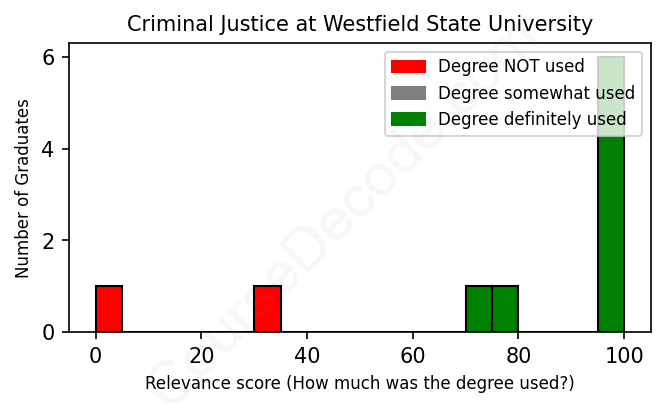
First, some facts. Of the Criminal Justice graduates from Westfield State University we've analyzed , here's how many have used (or NOT used) their degree in their career:

These are estimates based on AI analysis of 10 LinkedIn profiles (see below).
The verdict? Above average. Overall, with an average relevance score of 77%, Criminal Justice graduates from Westfield State University have a higher likelihood (+10%) of finding work in this field compared to the average graduate across all fields:
And for comparison, here's the chart for all profiles we've looked at across all degrees.
Also, after graduating, only 20% of these graduates have pursued further education other than another Bachelor's degree (such as a Masters degree or other), compared to the average across all profiles of 35%. This suggests a Bachelors degree is enough for most Criminal Justice graduates, and it's normal to look for work straight after graduation.
See the details:
|
Relevance score: 100% We think this person has gone into a career highly relevant to their degree. We think this person has gone into a career highly relevant to their degree.
DEGREE INFOGraduated in 2016 from Westfield State University with a Bachelors Degree in Criminal Justice. Also pursued further education since (see below). JOB HISTORY SINCE GRADUATIONVictim Witness Advocate Hampden County District Attorney's Office Sep 2016 - Nov 2023 Assistant District Attorney  Hampden District Attorney's Office Nov 2023 - Present FURTHER DEGREES DONE SINCE GRADUATINGMaster's degreeWestfield State University 2017 - 2019 ABOUTNo information provided. |
The top 10 most common jobs done by the graduates we've analyzed (ranked most common to least) are:
Looking at the job profiles of graduates from Westfield State University's Criminal Justice program, it’s clear that many of the roles they took on after graduation are quite relevant to their degree. A good number of them ended up in law enforcement roles like Police Officers and Correctional Officers, which require a solid understanding of criminal justice principles. In fact, positions such as the Victim Witness Advocate or Investigator roles at Citizens Bank also highlight how easily graduates transition into jobs that utilize their knowledge of the legal system and investigative techniques.
However, not all paths taken by these graduates align closely with the core concepts of Criminal Justice. A significant portion ventured into positions that don't rely on their degree, such as security roles or sales. For example, jobs like the Protection Specialist at Target and the Sales Consultant largely stray from the specialized knowledge of criminal justice, focusing more on general security or retail skills. So while there are many relevant roles that align well with their education, there’s also a noticeable trend of graduates finding themselves in jobs that don't leverage their Criminal Justice training as much. Overall, it seems like a mix of opportunities—some hitting the mark and others diverging into unrelated fields.
Here is a visual representation of the most common words in job titles for Criminal Justice graduates (this is across all Criminal Justice graduates we've analyzed, not just those who went to Westfield State University):

It looks like graduates from Westfield State University's Criminal Justice program have had a mixed bag of career trajectories, but many have found paths that align well with their degrees. Right after graduation, a lot of students seem to land jobs within the criminal justice field. For example, roles like Correctional Officer and different positions in law enforcement have been common starting points. It's pretty clear that many graduates are jumping directly into relevant positions, often as police officers or working in correctional facilities. It’s encouraging to see that initial steps for many are firmly planted in the criminal justice realm.
Fast forward a few years, and it appears that while some have advanced in their field, others have shifted gears entirely. We see some graduates moving up within law enforcement or taking investigative roles in financial institutions, which still relate to their studies. On the flip side, there are also graduates who have ventured into seemingly unrelated areas like sales and marketing, which indicates that not everyone stays on the criminal justice track long-term. Overall, while a good number of graduates find meaningful careers in criminal justice, others take a different route, showcasing that a degree in Criminal Justice can lead in various directions, depending on personal interests and opportunities that arise after graduation.
Honestly, a Bachelor’s degree in Criminal Justice at Westfield State University or really anywhere isn’t super easy, but it’s not the most brutal program out there either. It's got its challenges, like understanding laws, ethics, and the complexities of the criminal justice system, but a lot of students find it interesting and engaging. If you stay organized, keep up with your readings, and participate in discussions, you’ll probably find it manageable. Just like any degree, it requires dedication and a bit of critical thinking, but if you’re genuinely interested in the subject, it can be a rewarding experience rather than a headache!
Most commonly, in the LinkedIn profiles we've looked at, it takes people 4 years to finish a Bachelor degree in Criminal Justice.
Looking at the job history of these Criminal Justice graduates from Westfield State University, it seems like some are doing alright in terms of earnings, while others might not be cashing in as well as they could. For instance, the grad who became an Assistant District Attorney and the one who rose to a Team Leader in banking likely have solid salaries, given the responsibilities of those roles. On the flip side, positions like Correctional Officer and Police Officer tend to start off on the lower end of the pay scale, especially early in their careers, though they might lead to better pay in the long run. Overall, while some grads are probably making decent money, others may still be on the lower end, particularly at the start of their careers.
Here is a visual representation of the most common words seen in the "about" section of LinkedIn profiles who have a Bachelor degree in Criminal Justice (this is across all Criminal Justice graduates we've analyzed, not just those who went to Westfield State University). This may or may not be useful:

Here are all colleges offering a Bachelor degree in Criminal Justice (ordered by the average relevance score of their Criminal Justice graduates, best to worst) where we have analyzed at least 10 of their graduates: